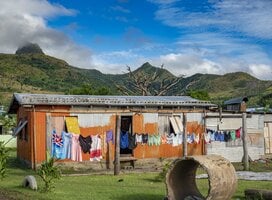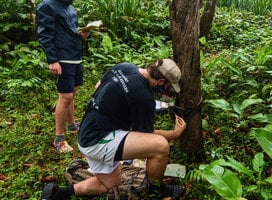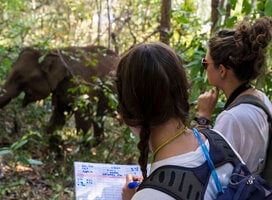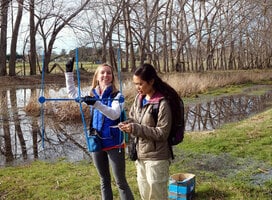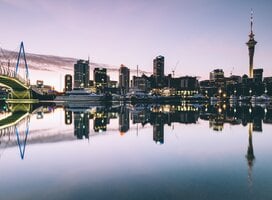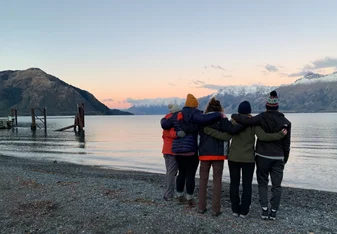Internships in Fiji
Diving among tropical fish in coral reefs, playing beach rugby with kids, working in community gardens framed by palm trees -- if this sounds like your dream internship, you and Fiji were meant for each other.
This remote nation, made up of more than 300 islands in the South Pacific, often gets bypassed in favor of its bigger, more popular Oceanic neighbors like Australia and New Zealand. What Fiji lacks in land mass, though, it makes up for in stunning scenery, amazing biodiversity, a rich cultural history -- and plenty of internships to go along with all of it.
From marine wildlife conservation to hospitality management, there are ample opportunities to get experience and get your feet wet (either figuratively or literally) with a Fiji-based internship. Just don't forget to schedule some beach R&R time in between all your internship responsibilities!
You may be wondering exactly which industries have open internships in paradise -- and your odds of ever being able to snag one. Fortunately for you, there are lots of internship opportunities on the islands, in some exciting and diverse fields. Here are some of the industries where you're most likely to find an internship:
Environment and Conservation
Because of its location, many internships in Fiji focus on environmental issues, marine biology, and wildlife conservation. You can intern with conservation organizations working with creatures like sea turtles and sharks, collect research on coral reefs, or help develop strategies to protect vital beach ecosystems. Several conservation and marine biology organizations also offer opportunities to get scuba diving experience and PADI certification as part of your internship.
Tourism
If you'd prefer to spend your time with people rather than turtles, don't worry, there are plenty of opportunities for you! Fiji has a booming tourism industry, and the island is always in need of more people to support its tourism services, especially during peak seasons (July to September and December-January). You can find internships in management, human resources, administration, and hospitality at local hotels or resorts.
Education
Like just about anywhere else in the world, there's constant demand for qualified, enthusiastic teachers and teaching assistants throughout Fiji's schools, especially outside of the urban areas. You probably won't be put in charge of your own classroom as an intern, but you could help coordinate after-school or enrichment activities, support local teachers in class or work one-on-one with students who want to improve their language skills.
Location
Most internship placements will be in one of the archipelago's urban centers. Suva, the capital, with a population of just under 90,000, is the closest thing Fiji has to a big city. You might also end up in Lautoka, the country's second city and sugar producing center; or Nadi, on the west coast of Fiji's main island, Viti Levu, a major tourist destination and the region's primary transportation hub.
If your internship is centered on ecology, conservation or marine biology, you may get a rural placement instead, out in a coastal village or on one of the smaller islands like Caqalai or Moturiki.
Housing
Since Fiji doesn't exactly have an endless supply of housing options, most internships will help you find housing or provide housing for interns. This could be through homestays or fixed internship housing, which range from dormitory-style sleeping arrangements to a group apartment or hostel.
Costs
The major cost of interning in Fiji is just getting to Fiji. Unless you're coming from Australia or Hawaii, you're talking about some long (and fairly expensive flights). Plan as far ahead as you can and set alerts to find the best prices possible on flights.
Passport holders from most countries aren't required to get a visa before arriving in Fiji, as long as you're not planning on staying for more than six months (four-month initial visitor permit, plus a possible two-month extension).
The good news is, once you're on-site, your program fee will cover most of your expenses, including housing, transportation, and food, so you only need to budget for one-time costs like travel insurance and extra spending money for food or excursions. Do keep in mind that, because Fiji is geographically isolated, the prices for staples like food and luxury goods may be higher than what you're used to paying at home.
Overall, Fiji is a relatively low-risk destination, as long as you don't stand directly under any ripe coconut trees. You're more likely to get food poisoning or an ear infection than anything else more serious, but ti's still worthwhile to take the usual precautions you would when traveling anywhere: make sure you have enough of any medication you need, and bring enough sunscreen and insect repellant for your time there.
Medical facilities in Fiji are generally pretty good, although as you get farther away from urban centers, the services available become more basic. You should make sure you have insurance that will cover you during your time there, in case you do have any more serious medical issues or need to leave for some reason.
The tap water in large towns like Suva and Nadi is chlorinated and generally safe to drink, although you can always boil it if you're worried. As a rule of thumb, it's generally a good idea to do this after heavy rains, no matter where you are. In more rural areas, it's best to avoid tap water and opt for boiled or bottled water instead.
